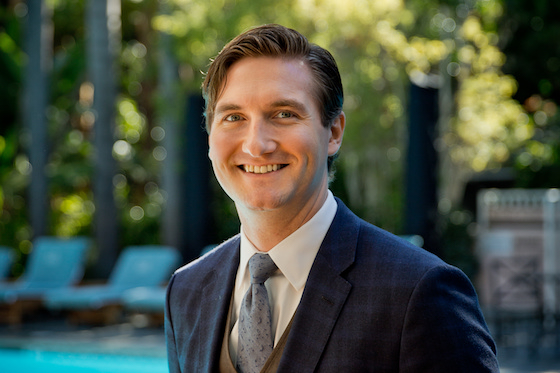Lukus Grace is at the heart of the “glitz and glamor” that makes the hotel industry special. The 36-year-old Grace, hotel manager at Hotel Bel-Air in Los Angeles, just celebrated his one-year anniversary in April at the storied hotel, one of nine luxury properties in the U.S. and Europe run by The Dorchester Collection. Making a hotel stay special starts by taking care of the staff, which means having a positive, fun culture that encourages creativity and flexibility. He says he draws management style from his mentor and father-in-law, legendary former president of the Ritz-Carlton Hotels, Horst Schulze, who taught him to focus on the vision that leads to buy-in from the staff.
Grace is one of 20 rising stars (all 40 and under) HOTELS interviewed for our May feature. All shared their insights about their lives in the business and thoughts about some of today’s challenges and opportunities. In a Wall Street Journal-sponsored series, read Grace’s responses to our questions and click here to link to the full list of interviews with HOTELS 20 Next-Gen hospitality leaders.

Contributed by Debbie Carlson
HOTELS: Glass ceilings and the old boys network in the hotel industry – how prevalent are they, and have they changed?
Lukus Grace: I think a lot of that is starting to go away as a lot of those guys are getting to the retirement age. I look at my hotel. My general manager is a woman, and there are a bunch of female department heads at Dorchester Collection. A lot of the executive team at Dorchester are females.
H: Are younger professionals creating their own networks? How do you develop your own network?
LG: Being part of Dorchester Collection, we have meetings a couple of times a year where all the hotels’ executives get a chance to get together, and you start building your networks then. We just had the Forbes Five Star event in Los Angeles. I was talking to the hotel manager at the St. Regis in New York. She said a bunch of luxury hotel managers get together once a quarter to talk and share some best practices. I want to try and implement it in L.A.
There’s two parts. There’s the getting to know other luxury hotel managers and kind of building that network. But then there’s also the network of meeting the older guard that’s kind of been there, done that, meeting people who’ve been in the industry for 20, 30 years, and worked at some of the best hotels in the world and getting a chance to learn from them because we need to carry on the legacy and romance of what the past was.
H: Company cultures: Are they shifting in a timely manner to meet hotel staff and corporate needs? What do you think needs to be updated about company culture to ensure that younger professionals are attracted to the hotel industry?
LG: Corporate culture is shifting fairly quickly and the industry is going so fast because technology is growing so fast. It’s easy to focus on just that (technology) because that’s what you can control more and can easier train around. But it’s really damaging to the culture of a hotel if we forget the purpose of why we’re there.
People ask, how do you engage millennials? They want the same thing that you’d want: to feel like they have a purpose. They want to show up and be able to take initiative.
H: Why are people getting into the hotel business and what does the industry need to do to become more attractive?
LG: There is a still a romance to hotels. Hotels are where you go on vacation, when you’re doing great things in life, whether it’s getting an award or celebrating an anniversary. I think we need to continue to highlight this because once you get into hotels, some of that glitz and glamour can go away because you get into the nitty gritty of an operation and running a business. And it’s hard, but we do have to figure out how to keep some of that glamour while getting into the operation. We’re still figuring that out. And we have to work on the life balance.
H: To what do you most attribute your success and growth?
LG: Mr. Schulze has been probably the biggest factor in my growth. I work with him at Capella (Hotel Group). In a company you read the vision and the mission statement, but it’s really left to your manager to interpret that vision and mission. Generally, they don’t follow it a hundred percent, believe in it or live it. To see Mr. Schulze live it, that really changed who I am because he gave me confidence in how I went about my day and how I drove that with my team. That inspired me to do more.
H: How is it having a family member as a mentor?
LG: It’s good. He wants me to be successful and yet he’s not one for nepotism. He would rather make my life harder to help me be successful than give me the easy street. It was hard at first, but it’s really beneficial in the end.
H: Describe something that you try to do every day, and why?
LG: I try to start my days by going around and shaking hands with everyone and saying good morning and hello. And I say the same thing every morning. This way I can get a gauge of where people are at emotionally, with employees and the leadership. It’s my moment to stay extremely positive and have big smile to kind of brighten their day a little bit.
